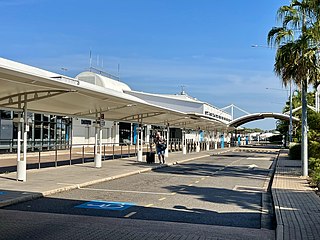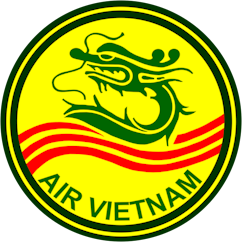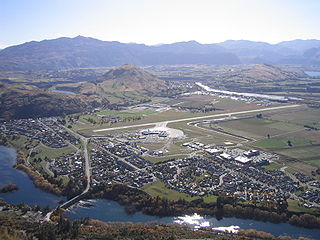Pacific Airlines Joint Stock Aviation Company is a low-cost airline and ground services provider headquartered in Tan Binh District, Ho Chi Minh City, Vietnam, with its primary operating base at Tan Son Nhat International Airport. From 2008 to 2020, it was known as Jetstar Pacific Airlines.
Vietnam Airlines is the flag carrier of Vietnam. The airline was founded in 1956 and later established as a state-owned enterprise in April 1989. Vietnam Airlines is headquartered in Long Biên district, Hanoi, with hubs at Noi Bai International Airport in Hanoi and Tan Son Nhat International Airport in Ho Chi Minh City. The airline flies 117 routes across 19 countries, excluding codeshared services.
Jetstar Airways Pty Ltd, trading as Jetstar, is an Australian low-cost airline headquartered in Melbourne, Victoria. It is a wholly owned subsidiary of Qantas, created in response to the threat posed by the airline Virgin Blue. Jetstar is part of Qantas' two-brand strategy of having Qantas Airways for the premium full-service market and Jetstar for the low-cost market. As of June 2015, Jetstar was carrying 8.5% of all passengers travelling in and out of Australia.

Gold Coast Airport is a domestic and international Australian airport located at the southern end of the Gold Coast and approximately 90 km (56 mi) south of Brisbane, within the South East Queensland agglomeration. The entrance to the airport is situated in the suburb of Bilinga near Coolangatta. The main runway itself cuts through the state borders of Queensland and New South Wales. During summer, these states are in two different time zones. The Gold Coast Airport operates on Queensland Time.

Tân Sơn Nhất International Airport is an international airport serving Ho Chi Minh City, the most populous city in Vietnam. The airport is located in the Tân Bình district within the Ho Chi Minh City metropolitan area.

Darwin International Airport is a domestic and international airport, and the only airport serving Darwin, Australia. It is the eleventh busiest airport in Australia measured by passenger movements.

Active from 1951 to 1975, Air Viet Nam was South Vietnam's first commercial air carrier, headquartered in District 1, Saigon. Established under a decree by Chief of State Bảo Đại, the airline flew over two million passengers, throughout the Vietnam War, and until its collapse due to the Fall of Saigon.

Da Nang International Airport is an international airport serving the area of Central Vietnam and the region's largest city Da Nang. It is the third international airport in the country, after Noi Bai International Airport (Hanoi) and Tan Son Nhat International Airport.

Nội Bài International Airport in Hanoi, the capital of Vietnam, is the country’s second largest and busiest international airport for passenger traffic, after Tan Son Nhat International Airport in Ho Chi Minh City. It is currently the main airport serving Hanoi, replacing the role of Gia Lam Airport. The airport consists of two passenger terminals and a cargo terminal. Terminal 1 serves domestic flights, and Terminal 2 serves all international flights to and from Hanoi. The airport is currently the main hub of the flag carrier Vietnam Airlines, travel carrier Vietravel Airlines, and an operating base of budget carriers Bamboo Airways and VietJet Air.

Buon Ma Thuot Airport is a public airport in Vietnam. The airport is located near the provincial capital Buon Ma Thuot in Đắk Lắk province. Another name for this airport is Phung-Duc Airport. It has one functional runway. A second incomplete runway is not in use. Two aprons are located on the south side of the airport with buildings that appeared to be used for aircraft storage. A barracks-like camp is located to the north side of the airport. This airport handled 860,000 passengers in 2016.

Cam Ranh International Airport is located on Cam Ranh Bay in Cam Ranh, a provincial city in Khánh Hòa province in Vietnam. It serves the city of Nha Trang, the capital of Khánh Hòa province, which is 30 km (16 NM) from the airport. This airport handled 9,747,172 passengers in 2019, making it the fourth busiest airport in Vietnam, after Ho Chi Minh City, Hanoi and Da Nang, and one of the fastest growing airports in the country.

Lien Khuong International Airport is an airport located in Đức Trọng district, about 30 km (19 mi) south of Da Lat, Lâm Đồng province. It is the largest of four airports in the Central Highlands region of Vietnam. The major reconstruction in order to handle bigger aircraft was completed in December 2009. This airport handled 1,690,000 passengers in 2019, an increase of 18.3% against that of 2014.

Queenstown International Airport is an international airport located in Frankton, Otago, New Zealand, which serves the resort town of Queenstown. The airport handled 2.25 million passengers as of 2018 making it the fourth busiest airport in New Zealand by passenger traffic. The airport is known for its scenery and challenging approach to land due to the nearby high terrain and proximity to housing.

Dong Hoi Airport is an airport located in Loc Ninh commune, 6 km (3.7 mi) north of Đồng Hới city, capital of Quảng Bình Province, in North Central Coast of Vietnam, about 500 km (310 mi) southeast of Hanoi by road. The facilities cover 173 ha, on a sandy area, by the coast of South China Sea. The runway approaches near the seashore and nearly parallel to the Highway 1. The airport, like all civil airports in Vietnam, is owned and operated by Airports Corporation of Vietnam.
Vietjet Aviation Joint Stock Company, operating as VietJet Air or Vietjet, is a Vietnamese low-cost airline based in Hanoi. It was the first privately owned airline to be established in Vietnam, being granted its initial approval to operate by the Vietnamese Ministry of Finance in November 2007. As of its launch in December 2011, it became the second private airline to offer domestic service in Vietnam, as well as the fifth airline overall to offer civil domestic flights. VietJet Air is owned by Sovico Holdings, HDBank, other organisational investors, and individual stakeholders.
The Vietnam Air Services Company, operating as its acronym VASCO, is an airline headquartered in Tân Bình district, Ho Chi Minh City, Vietnam. A fully owned subsidiary of Vietnam Airlines, it mainly operates regional scheduled flights on behalf of Vietnam Airlines. It also conducts charter flights, medical evacuations, SAR operations, oil platforms flights, and other aviation services.
Indochina Airlines was a Vietnamese airline based in Ho Chi Minh City. It was the first operational private airline based in Vietnam, originally licensed in May 2008 as Air Speed Up. The founder and chairman of the board was Vietnamese musician Hà Hùng Dũng. Indochina Airlines began selling tickets on 12 November 2008 and launched its first commercial flights from Tân Sơn Nhất International Airport in Ho Chi Minh City to Nội Bài International Airport in Hanoi and Đà Nẵng International Airport in Đà Nẵng on 25 November 2008. After a series of difficulties, including unresolved debts and a decrease in customers, Indochina Airlines ceased flying on November 25, 2009; its schedule was revoked two days later.
Trãi Thiên Air Cargo was a Vietnamese cargo airline. The company headquartered in Tan Son Nhat International Airport, Ho Chi Minh City, Vietnam. The company received a license from the Civil Aviation Administration of Vietnam on 16 October 2009 and was due to operate freight services in Vietnam and on international routes.

Vietnam Airlines Flight 850 was an international scheduled passenger flight from Bangkok to Ho Chi Minh City. On 4 September 1992, the Airbus A310-222 serving the flight was hijacked by Ly Tong, a former pilot in the South Vietnam Air Force. He then dropped anti-communist leaflets over Ho Chi Minh City before parachuting out. Vietnamese security forces later arrested him on the ground. The aircraft landed safely, and no one on board was injured. He was released from a Hanoi prison in 1998.












